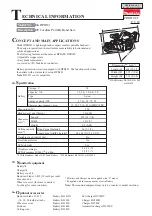
1. Machine layout (Figures 1/2)
1. On/Off
switch
2. Extractor
adapter
3. Retaining
screw
4. Wing
nut
5. Machine
foot
6. Extractor
socket
7.
Lower blade pulley
8.
Upper blade pulley
9. Tightening
screw
10. Blade guard
11. Upper blade guide
12. Side cover
13. Toggle fastener
14. Cross stop
15. Machine table
16. Dial scale for tilt angle
17. Arrow
18. Fixing handle for table
19. Setting wheel for blade guide
20. Fixing handle for blade guide
21. Clip for parallel stop
22. Setting screw for upper blade pulley
23. Motor
24. Parallel stop
25. Machine frame
26. Blade
2. Items supplied
Bandsaw
Machine table
Cross stop
Parallel stop
3. Proper use
The BM 240 bandsaw is designed to perform
longitudinal and cross cuts on timber or wood-type
materials. To cut round materials you must use
suitable holding devices.
The machine is to be
used only for its prescribed purpose.
Any use beyond that mentioned is considered to be
a case of misuse. The user/operator and not the
manufacturer shall be liable for any damage or injury
resulting from such cases of misuse.
The machine is to be operated only with suitable saw
blades. To use the machine properly you must also
observe the safety regulations, the assembly
instructions and the operating instructions to be
found in this manual.
All persons who use and service the machine have
to be acquainted with this manual and must be
informed about the machine’s potential hazards.
It is also imperative to observe the accident
prevention regulations in force in your area.
The same applies for the general rules of
occupational health and safety.
The manufacturer shall not be liable for any changes
made to the machine nor for any damage resulting
from such changes.
Even when the machine is used as prescribed it is
still impossible to eliminate certain residual risk
factors. The following hazards may arise in
connection with the machine’s construction and
design:
Damage to hearing if ear-muffs are not used as
necessary.
Harmful emissions of wood dust when used in
closed rooms.
Contact with the blade in the uncovered cutting
zone.
Injuries (cuts) when changing the blade.
Injury from catapulted workpieces or parts of
workpieces.
Crushed fingers.
Kickback.
Tilting of the workpiece due to inadequate
support.
Touching the blade.
Catapulting of pieces of timber and workpieces.
4. Important notes
Safety information
IMPORTANT!
Whenever you use electric tools it is
imperative to take basic safety precautions in order
to reduce the risk of fire, electric shock and personal
injury. Essential safety precautions include:
1. Keep your work area tidy!
-
An untidy work area invites accidents.
2. Check the working conditions!
-
Do not expose electric tools to rain.
-
Never use electric tools in damp or wet locations.
-
Make sure there is good lighting.
-
Do not use electric tools near flammable liquids
or gases.
3. Guard against electric shock!
-
Avoid body contact with earthed components.
4. Keep other persons away!
-
Do not allow other persons, particularly children,
to touch the tool or cable. Keep all persons out of
your work area.
5. Store tools in a safe place!
GB
16
BM 240 28.03.2003 9:02 Uhr Seite 16
















































